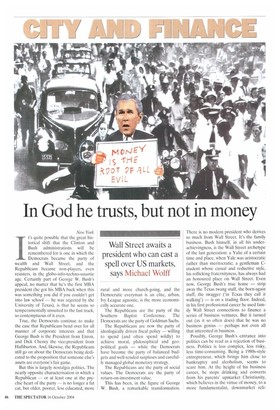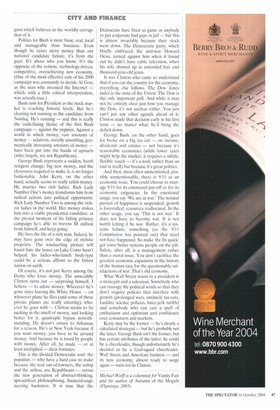In God he trusts, but not in money
Wall Street awaits a president who can cast a spell over US markets, says Michael Wolff
New York
It's quite possible that the great historical shift that the Clinton and Bush administrations will be remembered for is one in which the Democrats became the party of wealth and Wall Street, and the Republicans became non-players, even resisters, in the globo-info-techno-smartie age. Certainly part of George W. Bush's appeal, no matter that he's the first MBA president (he got his MBA back when this was something you did if you couldn't get into law school — he was rejected by the University of Texas), is that he seems so temperamentally unsuited to the fast track, so contemptuous of it even.
True, the Democrats continue to make the case that Republicans bend over for all manner of corporate interests and that George Bush is the President from Enron, and Dick Cheney the vice-president from Halliburton. And, likewise, the Republicans still go on about the Democrats being dedicated to the proposition that someone else's assets are everyone's fair game.
But this is largely nostalgia politics. The nearly opposite characterisation in which a
Republican or at least one at the psychic heart of the party — is no longer a fat cat, but older, poorer, less educated, more
rural and more church-going, and the Democratic everyman is an elite, urban, Ivy League agnostic, is the more economically accurate one.
The Republicans are the party of the Southern Baptist Conference. The Democrats are the party of Goldman Sachs.
The Republicans are now the party of ideologically driven fiscal policy — willing to spend (and often spend wildly) to achieve moral, philosophical and geopolitical goals — while the Democrats have become the party of balanced budgets and well-tended surpluses and carefully managed global monetary strategy.
The Republicans are the party of social values. The Democrats are the party of return-on-investment value.
This has been, in the figure of George W. Bush, a remarkable transformation. There is no modern president who derives so much from Wall Street. It's the family business. Bush himself, in all his underachievingness, is the Wall Street archetype of the last generation: a Yalie of a certain time and place, when Yale was aristocratic rather than meritocratic; a gentleman Cstudent whose casual and reductive style, his rollicking fraternityness, has always had an honoured place on Wall Street. Even now, George Bush's true home — strip away the Texas twang stuff, the born-again stuff, the swagger (In Texas they call it walking') — is on a trading floor. Indeed, in his first professional career he used family Wall Street connections to finance a series of business ventures. But it turned out (as it so often does) that he was no business genius — perhaps not even all that interested in business.
Possibly, George Bush's entrance into politics can be read as a rejection of business. Politics is less complex, less risky, less time-consuming. Being a 1980s-style entrepreneur, which brings him close to bankruptcy and alcoholism, seems to scare him. At the height of his business career, he stops drinking and converts from his parents' upmarket Christianity, which believes in the virtue of money, to a more fundamentalist, downmarket reli
gion which believes in the worldly corruption of it.
Politics for Bush is more basic, real, local and manageable than business. Even though he raises more money than any national candidate before, it's from the guys. It's about who you know. It's the opposite of the remote, technology-driven, competitive, overachieving new economy. (One of the most effective cuts of his 2000 campaign was constantly to deride Al Gore as the man who invented the Internet — which, with a little critical interpretation, was actually true.) Bush runs for President as the stock market is reaching historic levels. But he's clearing not running as the candidate from Nasdaq. He's running — and this is really the underlining theme of the first Bush campaign — against the yuppies. Against a world in which money, vast amounts of
money relativist, socially unsettling, geometrically increasing amounts of money — have been put into the hands of upstarts (who, largely, are not Republican).
George Bush represents a sudden, harsh zeitgeist change; big new money, and the cleverness required to make it, is no longer fashionable. John Kerry, on the other hand, actually seems to really relish money. He marries two rich ladies. Rich Lady Number One's money transforms him from radical activist into political opportunist. Rich Lady Number Two is among the richest ladies in the world. Her money makes him into a viable presidential candidate: at the pivotal moment of his failing primary campaign he's able to borrow $8 million from himself, and keep going.
He lives the life of a rich man. Indeed, he may have gone over the edge of stylistic propriety. The windsurfing picture will haunt him; the house on Lake Como hasn't helped; his ladies-who-lunch body-type could be a serious affront to the fattest nation on earth.
Of course, it's not just Kerry among the Dems who loves money. The unwealthy Clinton turns out — surprising himself, I believe — to adore money. Wherever he's gone since leaving the White House — on whosever plane he flies (and some of these private planes are really amazing), whoever he goes with — Clinton seems to be sucking in the smell of money, and looking better for it, quadruple bypass notwithstanding. He doesn't return to Arkansas for a reason. He's in New York because if you want money, you have to be around money. And because he is loved by people with money. After all, he made — or at least multiplied — their fortunes.
This is the divided Democratic soul: the populists — who have a hard case to make because the real out-of-towners, the unhip and the artless, are Republicans — versus the new generation of abstract-thinking, spreadsheet philosophising, financial-engineering hucksters. It is true that the Democrats have been as game as anybody to put corporate had guys in jail — hut this is almost invariably because their stock went down. The Democratic party, which briefly embraced the anti-war Howard Dean, turned against him when it found out he didn't have cable television, when his wife showed up in untended hair and thousand-year-old jeans.
It was Clinton who came to understand that if you ran the country for the economy, everything else follows. The Dow Jones index is the state of the Union. The Dow is the only important poll. And while it may not be entirely clear just how you manage the Dow, it's not unclear either. You just can't put any other agenda ahead of it. Clinton made that decision early in his first term — no matter what, he'd bring the deficit down.
George Bush, on the other hand, goes for broke on a big tax cut — on income, dividends and estates — not because it's reasonable economics (while lower taxes might help the market, it requires a subtle, flexible touch — it's a tool, rather than an end in itself) but because it's great politics.
And then, most often unmentioned, possibly unmentionable, there is 9/11 as an economic issue. You could choose to manage 9/11 for its emotional pay-off or for its economic exigencies. In the emotional usage, you say 'We are at war.' The normal pursuit of happiness is suspended; growth is forestalled; resources reallocated. In the other usage, you say 'This is not war.' It does not have to become war. It is not worth letting it be war. Rather, it's a systems failure, something (as the 9/11 Commission has pointed out) that need not have happened. So make the fix quick: get some better systems people on the job. Safety, after all, is a management rather than a moral issue. You don't sacrifice the greatest economic expansion in the history of the human race for the questionable satisfactions of war. That's old economy.
What Wall Street wants in a president is a strategist and a salesman. Somebody who can manage the political winds so that they don't require policies that interfere with growth (prolonged wars, untimely tax cuts, Luddite science policies, knee-jerk tariffs) and somebody who can cast a spell of enthusiasm and optimism and confidence over consumers and markets.
Kerry may be the former — he's clearly a calculated strategist — but he's probably not the latter. George Bush isn't the former, but has certain attributes of the latter: he could be a cheerleader, though unfortunately he's decided to be a God-squad cheerleader. Wall Street and American business — and its new economy, almost ready to surge again — waits for its Clinton.
Michael Wolff is a columnist for Vanity Fair and the author of Autumn of the Moguls (Flamingo, 2003).











































































































 Previous page
Previous page